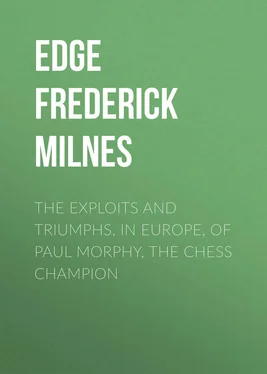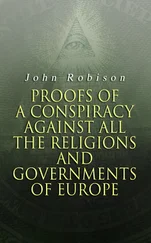Frederick Edge - The Exploits and Triumphs, in Europe, of Paul Morphy, the Chess Champion
Здесь есть возможность читать онлайн «Frederick Edge - The Exploits and Triumphs, in Europe, of Paul Morphy, the Chess Champion» — ознакомительный отрывок электронной книги совершенно бесплатно, а после прочтения отрывка купить полную версию. В некоторых случаях можно слушать аудио, скачать через торрент в формате fb2 и присутствует краткое содержание. Жанр: Развлечения, foreign_antique, foreign_prose, на английском языке. Описание произведения, (предисловие) а так же отзывы посетителей доступны на портале библиотеки ЛибКат.
- Название:The Exploits and Triumphs, in Europe, of Paul Morphy, the Chess Champion
- Автор:
- Жанр:
- Год:неизвестен
- ISBN:нет данных
- Рейтинг книги:4 / 5. Голосов: 1
-
Избранное:Добавить в избранное
- Отзывы:
-
Ваша оценка:
- 80
- 1
- 2
- 3
- 4
- 5
The Exploits and Triumphs, in Europe, of Paul Morphy, the Chess Champion: краткое содержание, описание и аннотация
Предлагаем к чтению аннотацию, описание, краткое содержание или предисловие (зависит от того, что написал сам автор книги «The Exploits and Triumphs, in Europe, of Paul Morphy, the Chess Champion»). Если вы не нашли необходимую информацию о книге — напишите в комментариях, мы постараемся отыскать её.
The Exploits and Triumphs, in Europe, of Paul Morphy, the Chess Champion — читать онлайн ознакомительный отрывок
Ниже представлен текст книги, разбитый по страницам. Система сохранения места последней прочитанной страницы, позволяет с удобством читать онлайн бесплатно книгу «The Exploits and Triumphs, in Europe, of Paul Morphy, the Chess Champion», без необходимости каждый раз заново искать на чём Вы остановились. Поставьте закладку, и сможете в любой момент перейти на страницу, на которой закончили чтение.
Интервал:
Закладка:
For this purpose it was suggested that Mr. Morphy, the winner at the late Congress and the present American champion, should cross the ocean, and boldly encounter the distinguished magnates of the transatlantic chess circles; but it unfortunately happens that serious family reasons forbid Mr. Morphy, for the present, to entertain the thought of visiting Europe. It, therefore, becomes necessary to arrange, if possible, a meeting between the latter and the acknowledged European champion, in regard to whom there can be no scope for choice or hesitation – the common voice of the chess world pronounces your name; and to us it is a subject of congratulation that the sceptre of transatlantic chess is wielded by one who, with respect to regularity of communication between the two countries, and for other reasons, enjoys facilities for accepting our invitation possessed by no other European player.
We take the liberty herewith to inclose a series of proposed "terms of the match," which has been drawn up, not for the purpose of imposing conditions, but with a view to obviate the necessity of repeated correspondence. We have been studious to make these terms as equitable as possible, and to include all matters upon which contestation was likely to arise. You are respectfully invited to suggest any alterations which you may deem advisable, not only in the minor points embraced, but also as to the amount of the stakes, the time fixed for the commencement of the match, &c., &c.
Fully subscribing to the wisdom of the proposal made by you in the introduction to the "Book of the Tournament," we beg leave to express our entire willingness to insert a clause providing that "one-half at least" (or even all ) "of the games shall be open ones."
In conclusion, Sir, receive the assurance that it will afford us extreme pleasure to welcome among us a gentleman, who is as greatly admired for his powers in play as he is esteemed for his many and valuable contributions to the literature of chess.
Hoping soon to receive a favorable answer, we remain, with distinguished regard, your obedient servants,

1. The amount of the stakes, on each side, to be five thousand dollars, and the winner of the first eleven games to be declared the victor, and entitled to the stakes.
2. The match to be played in the city of New Orleans.
3. Should the English player lose the match, the sum of one thousand dollars (£200) to be paid to him out of the stakes, in reimbursement of the expenses incurred by him in accepting this challenge.
4. The games to be conducted in accordance with the rules laid down in Mr. Staunton's "Chess Player's Handbook."
5. The parties to play with Staunton chessmen of the usual club-size, and on a board of corresponding dimensions.
6. The match to be commenced on or about the first of May, 1858, (or on any other day during the present year most agreeable to Mr. Staunton,) and to be continued at not less than four sittings each week.
7. In order that the stay of the English player in New Orleans be not unnecessarily prolonged, he shall have the right to fix the hours of play at from ten o'clock, A. M., to two, P. M., and from six to ten o'clock, P. M.
8. The time occupied in deliberating on any move, shall not exceed thirty minutes.
9. The right to publish the games is reserved exclusively to the contestants, subject only to such private arrangements as they may agree upon.
10. The stakes on the part of Mr. Staunton to be deposited prior to the commencement of the match in the hands of – ; and those on the part of Mr. Morphy, in the hands of Eugene Rousseau, Esq., cashier of the Citizen's Bank of Louisiana.
On the 3d of April, Mr. Staunton replied to this very flattering communication as follows, through the "Illustrated London News: " —
"Proposed Chess Match between England and America for One Thousand Pounds a Side. – We have been favored with a copy of the defi which the friends of Mr. Paul Morphy, the chess champion of the United States, have transmitted to Mr. Staunton. The terms of this cartel are distinguished by extreme courtesy, and with one notable exception, by extreme liberality also. The exception in question, however, (we refer to the clause which stipulates that the combat shall take place in New Orleans!) appears to us utterly fatal to the match; and we must confess our astonishment that the intelligent gentlemen who drew up the conditions did not themselves discover this. Could it possibly escape their penetration, that if Mr. Paul Morphy, a young gentleman without family ties or professional claims upon his attention, finds it inconvenient to anticipate, by a few months, an intended voyage to Europe, his proposed antagonist, who is well known for years to have been compelled, by laborious literary occupation, to abandon the practice of chess beyond the indulgence of an occasional game, must find it not merely inconvenient, but positively impracticable, to cast aside all engagements, and undertake a journey of many thousand miles for the sake of a chess-encounter? Surely the idea of such a sacrifice is not admissible for a single moment. If Mr. Morphy – for whose skill we entertain the liveliest admiration – be desirous to win his spurs among the chess chivalry of Europe, he must take advantage of his purposed visit next year; he will then meet in this country, in France, in Germany, and in Russia, many champions whose names must be as household words to him, ready to test and do honor to his prowess."
Can this mean aught else than, "Come over to England and I will play you?"
CHAPTER IV
CHESS IN ENGLAND
Most of us know how "Box," when called upon by "Cox," to give explanations of the improper attentions he (Box) was paying to C.'s wife, hums and haws and begins, "Towards the close of the sixteenth century;" when Cox very properly cries out, "What the deuce has the sixteenth century to do with my wife?" Many of my readers may, like Cox, want to know what a great deal my book contains has to do with Paul Morphy; all I have to say, in reply, is, – if you don't like it, skip it; more especially the following thirty pages, which, nevertheless, will be interesting to all chess-players.
Chess seems to have first acquired social importance in England during Philidor's residence in that country. Judging from the number of titled names attached to his work as subscribers, the British aristocracy were, in his time, much given to the game, but "nous avons changé tout cela," and the English nobility nowadays, with but a few notable exceptions, confine their abilities to "Tattersall's" and "Aunt Sally."
"What a fall was there, my countrymen!"
Surely the "King of Games," which has enlisted amongst its votaries such names as that of the victor of Culloden, and his rival, Maréchal Saxe; without enumerating those of all the greatest warriors of many centuries, might still offer inducements to their comparatively unknown descendants. We have thousands of men, composing the British aristocracy, at a loss to get rid of their time; sauntering down to their clubs at mid-day; listlessly turning over the leaves of magazines and reviews, until their dinner-hour arrives. Why, in the name of common sense, do not these men learn something of chess, and thus provide themselves with a pastime which not merely hastens Time's chariot-wheels, but quickens the intellect? One gets tired of billiards, cards, horse-racing, etc., but your chess-player becomes more enamored of his game, the more he knows of it.
It may have been that gentlemen and nobles affixed their names to Philidor's book, out of compliment or charity, but it is doubtful whether their descendants would now do so, even from those considerations. Must we measure the capacity of dukes and lords by that intellectual standard, "Aunt Sally?"
Читать дальшеИнтервал:
Закладка:
Похожие книги на «The Exploits and Triumphs, in Europe, of Paul Morphy, the Chess Champion»
Представляем Вашему вниманию похожие книги на «The Exploits and Triumphs, in Europe, of Paul Morphy, the Chess Champion» списком для выбора. Мы отобрали схожую по названию и смыслу литературу в надежде предоставить читателям больше вариантов отыскать новые, интересные, ещё непрочитанные произведения.
Обсуждение, отзывы о книге «The Exploits and Triumphs, in Europe, of Paul Morphy, the Chess Champion» и просто собственные мнения читателей. Оставьте ваши комментарии, напишите, что Вы думаете о произведении, его смысле или главных героях. Укажите что конкретно понравилось, а что нет, и почему Вы так считаете.












